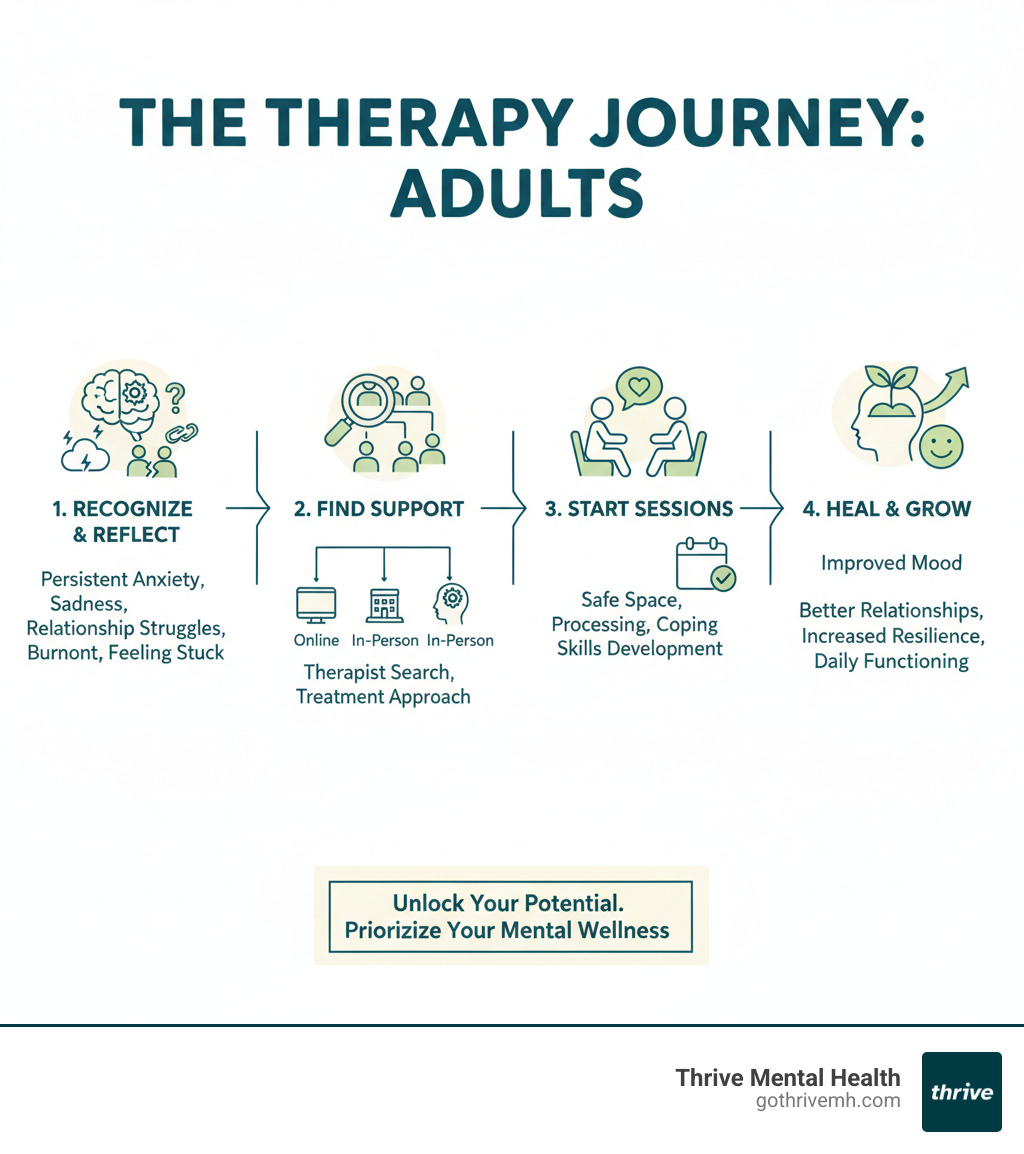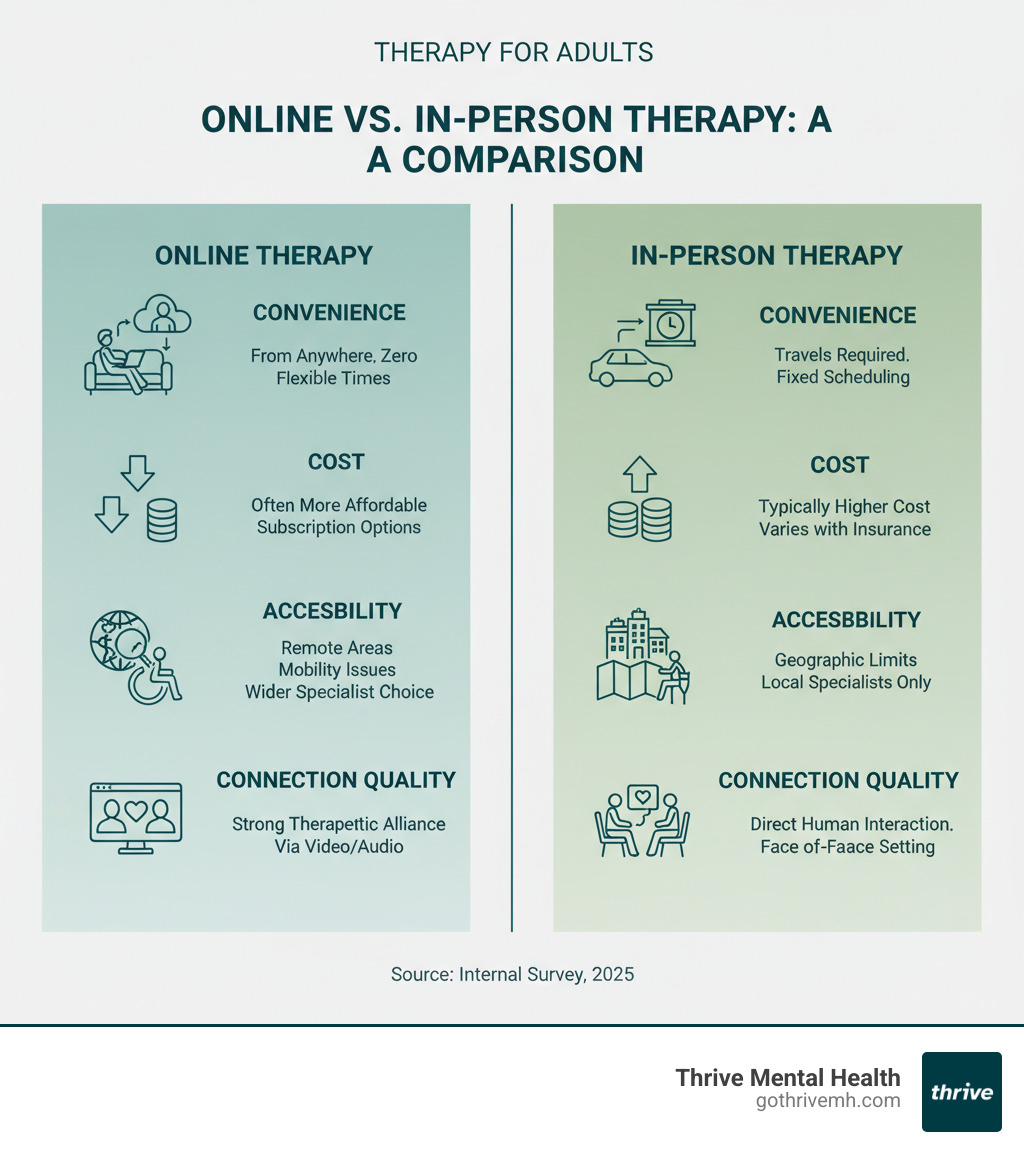Your Mental Health Matters: A Guide to Adult Therapy

Therapy for Adults: Ultimate Guide for a Healthier 2025
Why Therapy for Adults Has Become Essential in Today’s World
Therapy for adults has transformed from a whispered secret into a recognized tool for mental wellness and personal growth. With over 41.7 million U.S. adults seeking therapy in 2021, including many here in Florida, the stigma is fading as more people prioritize their mental health.
Quick Answer: What is therapy for adults?
- Individual therapy: One-on-one sessions with a licensed therapist
- Group therapy: Structured sessions with multiple participants
- Intensive programs: IOP (Intensive Outpatient) and PHP (Partial Hospitalization) for comprehensive care
- Online therapy: Virtual sessions offering flexibility and accessibility
- Specialized approaches: CBT, DBT, EMDR, and other evidence-based treatments
Whether you’re dealing with anxiety, depression, or relationship challenges, therapy provides a safe space to develop healthy coping strategies. Research shows that 70% of people see improvement in anxiety or depression symptoms within three months of starting.
Modern therapy is flexible, with in-person, virtual, and hybrid options to fit your schedule. This accessibility makes it easier than ever for busy adults to get the support they need.
As the founder of Thrive and a licensed therapist, I’ve seen how transformative the right support can be. My goal is to make high-quality therapy for adults accessible to those in Florida through evidence-based, virtual-first programs.

Therapy for adults vocabulary:
Do I Need Therapy? 6 Signs It’s Time for Support
Knowing when to get help is often the hardest part. Therapy for adults isn’t just for major crises; it’s a proactive tool for managing everyday stress and building resilience. Think of it as a workout for your mental health. You don’t have to be at rock bottom to benefit.
Here are some common signs that you might benefit from professional support:
-
Emotional Signs: You’re experiencing persistent sadness, irritability, or a feeling of being overwhelmed that won’t lift. Maybe anxiety has become a constant companion, making it hard to enjoy things you used to love. Anxiety symptoms can significantly impact your daily life, and recognizing them is the first step.
-
Behavioral Changes: You’re withdrawing from friends, using alcohol more often, or have lost interest in hobbies. Significant changes in sleep patterns—sleeping too much or too little—are also red flags.
-
Cognitive Patterns: You’re struggling to concentrate, caught in loops of negative thoughts, or finding it nearly impossible to make decisions. These are signs your brain could use professional support.
-
Relationship Struggles: You keep having the same fights, feel disconnected from your partner or friends, or notice unhealthy patterns repeating. Therapy can help you learn new ways of connecting.
-
Life Transitions: Even positive changes like a new job or moving can be destabilizing. Therapy provides support through divorce, grief, and other major life events that feel too big to handle alone.
-
Physical Symptoms: Chronic headaches, digestive issues, or persistent fatigue without a clear medical cause can be your body’s way of signaling that your mental health needs attention.
The bottom line: If you’re in Florida and feel stuck, overwhelmed, or just want to improve your life, those are valid reasons to consider therapy for adults. You don’t need a crisis to deserve support. Prioritizing your mental health is a powerful step toward a better life.
What Kind of Therapy Is Right for Me? [A 2025 Guide]
When you’re ready to explore therapy for adults, the number of options can feel overwhelming. This variety exists because there’s no one-size-fits-all solution. The goal is to find an evidence-based approach that fits your unique needs, whether you’re dealing with anxiety, trauma, or relationship patterns.

Common Therapeutic Approaches
-
Cognitive Behavioral Therapy (CBT): The gold standard for many issues, CBT helps you identify and change negative thought patterns and behaviors. It’s structured, goal-oriented, and effective for anxiety, depression, and PTSD. Learn more in our guide to CBT for Mood Disorders.
-
Dialectical Behavior Therapy (DBT): If you experience intense, overwhelming emotions, DBT can help. It teaches four core skills: mindfulness, distress tolerance, emotion regulation, and interpersonal effectiveness. It focuses on accepting difficult emotions while changing unhelpful behaviors. See how it works in DBT Explained.
-
Eye Movement Desensitization and Reprocessing (EMDR): A approach for trauma, EMDR helps your brain process distressing memories to reduce their emotional charge. Using guided eye movements, it can bring rapid relief from PTSD and anxiety. Explore our guide on EMDR Therapy Techniques for Trauma Recovery.
-
Psychodynamic Therapy: This approach explores how past experiences and unconscious thoughts shape your current behavior and relationships. It’s like detective work for your mind, uncovering hidden connections.
-
Humanistic Therapy: Focused on your potential for growth, this approach emphasizes personal responsibility, authenticity, and self-acceptance to help you reconnect with your inner wisdom.
Different Levels of Care for Adult Therapy
Beyond the approach, you’ll also choose a level of care that matches your needs.
-
Individual Therapy: The most common format, offering one-on-one, confidential sessions to explore your thoughts and feelings at your own pace.
-
Group Therapy: Provides the power of shared experience, connecting you with others facing similar struggles for mutual support and new perspectives.
-
Intensive Outpatient Programs (IOP): For when weekly therapy isn’t enough, IOPs offer several hours of therapy multiple days a week while you maintain your daily routine. Our Intensive Outpatient Programs (IOP) include flexible evening options for adults in Florida.
-
Partial Hospitalization Programs (PHP): The highest level of outpatient care, PHPs provide full-day structured treatment for individuals needing intensive, coordinated support without an overnight stay. Learn more in our Guide to Partial Hospitalization Programs.
Not sure which is right for you? Our comparison of PHP vs. IOP: Understanding the Differences can help you decide. The key is finding a flexible treatment plan that can adapt as your needs change.
The Therapy Journey: What to Expect and How to Succeed
Starting therapy for adults can feel like stepping into the unknown, but a clear roadmap can turn uncertainty into confidence. Success in therapy comes from active participation, openness, and finding the right professional for your needs.

Finding the Right Therapist for Your Needs
Finding the right therapist is like dating—the connection is key. Take your time to find someone who gets you.
- Credentials Matter: Look for licensed professionals like LPCs, LCSWs, LMFTs, or psychologists.
- Find a Specialist: If you’re dealing with trauma, ADHD, or other specific issues, seek out a therapist with expertise in that area.
- Rapport is Crucial: You need to feel comfortable and safe. Trust your gut—it’s okay to switch if the fit isn’t right.
- Use Directories: Use sites like Psychology Today to filter by specialty, insurance (Cigna, Optum, Aetna, Florida Blue), and location (including Florida).
- Ask Questions: During a consultation, ask about their experience with your concerns, their treatment approach, and how they measure progress. Our guide on Choosing a Mental Healthcare Provider can help.
Your First Session and Beyond
- The Intake Process: Your first session is a conversation where your therapist learns about your background, challenges, and goals.
- Building the Alliance: A good therapist creates a safe, non-judgmental space. Just being truly heard can be incredibly healing.
- Setting Goals: You’ll work together to define clear, achievable goals for your therapy journey.
- Applying Your Skills: Many therapists assign “homework,” like journaling or practicing new skills between sessions, to help you apply what you learn to real life.
- Evaluating Progress: You’ll regularly check in on your progress and adjust your plan as needed. Therapy is not always a straight line.
Online vs. In-Person Therapy for Adults
Online therapy has made mental health support more accessible than ever. Research shows online therapy is as effective as in-person options for many conditions, including anxiety and depression.

| Feature | Online Therapy | In-Person Therapy |
|---|---|---|
| Convenience | Highly convenient – no commute, flexible scheduling. 98% found it more convenient. | Requires travel, which can be time-consuming. |
| Cost | Often more affordable with lower per-session rates. | Typically higher per-session costs. |
| Accessibility | Perfect for remote areas or packed schedules. Wider selection of specialists. | Limited by your location and local availability. |
| Connection | Strong therapeutic relationships develop via video. Many find it easier to open up from home. | Direct face-to-face interaction with full non-verbal cues. |
| Effectiveness | Research shows equal or greater effectiveness for many conditions. | The traditional gold standard for psychotherapy. |
| Privacy | Secure platforms ensure confidentiality. | Complete privacy within the therapist’s office. |
Online therapy offers flexibility, a wider choice of specialists, and often more affordable options. It’s a proven, effective way to get support that fits your life. For those in Florida needing more intensive support, our Telehealth Therapy and Outpatient Programs provide comprehensive treatment that fits your lifestyle.
What Are the Benefits of Therapy for Adults?
Therapy for adults is more than just problem-solving; it’s an investment in your long-term well-being and personal growth. The benefits extend far beyond the therapy room, creating a foundation for a more resilient and fulfilling life.

Research shows 70% of people see improvement in anxiety or depression symptoms within three months of starting therapy. Here’s how that change happens:
-
Develop Healthy Coping Skills: Instead of falling into unhelpful habits, you’ll learn practical strategies to manage stress, handle conflict, and steer challenges with confidence.
-
Improve Relationships: Therapy helps you understand your interpersonal patterns, set healthy boundaries, and build more authentic and fulfilling connections with partners, family, and friends.
-
Process Trauma and Grief: With professional support, you can find a safe, structured space to work through difficult experiences without letting them define your future.
-
Gain Deep Self-Awareness: You’ll begin to understand your core values, motivations, and the patterns holding you back, empowering you to make choices that align with your true self.
-
Achieve Personal Growth: Therapy builds resilience and confidence. A study even found that talk therapy can strengthen brain connections, creating positive changes that last long after your sessions end.
Therapy provides targeted relief for specific conditions like anxiety, depression, and ADHD. For example, one study found that specialized CBT helped adults with ARFID add an average of 18 new foods to their diet. The changes might start small—sleeping better, feeling more hopeful—but they add up to a life that feels more manageable and authentic.
How Much Does Therapy Cost? [Insurance & Affordability]

When you’re struggling, the cost of help shouldn’t be another source of stress. The good news is that therapy for adults is more accessible and affordable than ever, especially with insurance and online options.
Traditional therapy can cost $100-$250 per session, but online platforms are often more budget-friendly. The key to affordability is understanding your insurance benefits. The Mental Health Parity Act requires most health plans to cover mental health services similarly to medical care.
Choosing an in-network therapist is usually the most cost-effective option, as you’ll likely only pay a standard co-pay ($20-$50). With an out-of-network provider, you pay upfront and seek reimbursement from your insurer.
At Thrive Mental Health, we work with major insurance providers like Cigna, Optum, Aetna, and Florida Blue to make our virtual programs accessible across Florida. We help clients throughout the state maximize their coverage.
To verify your benefits, call your insurance provider and ask:
- Does my plan cover outpatient mental health services?
- What is my co-pay for mental health?
- Do I need a referral?
- Does my plan cover telehealth sessions?
If you don’t have insurance, ask about sliding scale fees based on income. You can also use pre-tax dollars from a Health Savings Account (HSA) or Flexible Spending Account (FSA) to pay for therapy.
Investing in your mental health is an investment in your future. For more details, see our guide on How to Get Health Insurance for Therapy.
Frequently Asked Questions about Therapy for Adults
It’s natural to have questions when considering therapy for adults. Here are concise answers to some of the most common concerns.
How do I know if I really need therapy?
Therapy isn’t just for crises. If you feel stuck, overwhelmed, or notice persistent struggles with your mood, relationships, or daily functioning, professional support can help. You don’t need to hit rock bottom to benefit from learning new coping skills and gaining self-awareness.
How long does therapy for adults usually take?
It depends entirely on your goals. Short-term therapy (around 8-20 sessions) can be effective for specific stressors or skill-building. Deeper issues, like complex trauma or long-standing patterns, may benefit from longer-term work. It’s a collaborative process, and you and your therapist will decide on the timeline together.
Is what I say in therapy confidential?
Yes, therapy is confidential. Your therapist is legally and ethically bound to protect your privacy. The only exceptions are rare situations involving imminent danger to yourself or others, or if there is suspected abuse of a child or vulnerable adult. These limits exist to ensure safety and will be discussed with you.
What’s the difference between a therapist, psychologist, and psychiatrist?
These titles can be confusing, but here’s a simple breakdown:
- Therapist: A broad term for a professional trained in psychotherapy (e.g., LPC, LCSW, LMFT).
- Psychologist: Has a doctoral degree (Ph.D. or Psy.D.), provides therapy, and can perform psychological testing.
- Psychiatrist: A medical doctor (M.D.) who specializes in mental health, can prescribe medication, and may also provide therapy.
The most important factor is finding a qualified professional who specializes in your concerns and with whom you feel a strong rapport.
Take the Next Step Toward a Healthier You
Investing in your mental health is a powerful act of self-respect. Therapy for adults provides the tools to build resilience, steer challenges, and create a more fulfilling life.
Taking that first step is a sign of strength. At Thrive Mental Health, we make it easier for adults in Florida with flexible programs designed for busy schedules. Our virtual and hybrid IOP/PHP programs, including evening options, offer high-quality, evidence-based care that fits into your real life. You don’t have to choose between your responsibilities and your well-being.
The path to better mental health starts with a single step. Your future self—the one who feels more confident, resilient, and at peace—is waiting.
Ready for support in Florida? Thrive offers virtual and hybrid IOP/PHP with evening options. Verify your insurance in 2 minutes (no obligation) → Start benefits check or call 561-203-6085. If you’re in crisis, call/text 988.